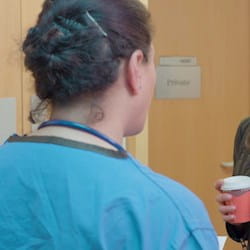A NEW study funded by Cancer Research UK has found that a third of cancer patients (34 per cent) diagnosed as an emergency in England had not consulted their GP beforehand.
The research published in the British Journal of General Practice used data from more than 4,600 cancer patients with 18 different types of cancer to determine how many times they had visited their GP before their disease was diagnosed as an emergency. Cancers diagnosed as emergencies are more likely to lead to poorer outcomes in patients as these are usually at a late stage.
Among the cancer patients presenting as an emergency with no prior GP visits, most were men, the elderly and those from more deprived backgrounds. The researchers point to a range of practical, emotional and health barriers that can make these groups less likely to promptly seek help from their GP.
The study also found that almost a quarter (23 per cent) of the patients had visited their GP three or more times before being diagnosed as an emergency. Some of these patients had cancers that are more difficult to spot, such as myeloma and lung cancer, which could be the reason for the multiple visits. Some people also presented at a young age which can make a cancer diagnosis less likely as symptoms may be usually more associated with older people.
Dr Georgios Lyratzopoulos, one of the lead researchers based at University College London, said: “These findings tell us that some patients diagnosed as an emergency might not be acting on ‘red flag’ symptoms which could have prompted them to visit their GP. There’s also a host of other factors that may be at play. For example, many elderly patients may find it difficult to get to the surgery or have other conditions which would prevent them from seeking an appointment, such as dementia.
“This highlights the need to explore all the reasons why cancers are diagnosed late, including what happens outside GP surgeries. It also shows that late diagnosis is more complex than it’s often presented to be, as there are multiple reasons why cancers are spotted late.”
Professor Helen Stokes-Lampard Chair of the Royal College of GPs commented: “Early diagnosis of cancer leads to better health outcomes for our patients and we know that those who visit their GP, in the majority of cases, will be diagnosed at a timely stage - 75% of patients found to have cancer are referred after only one or two GP consultations.
“In the last five years the proportion of cancers diagnosed as an emergency has dropped from 25% to 20%, and a higher proportion of patients are being diagnosed at an earlier stage of the disease.
“Family doctors would be helped by increased access to new and improved diagnostic tools to help them identify cancers that are more difficult to spot, and this is something that the RCGP has long been calling for.”
This page was correct at the time of publication. Any guidance is intended as general guidance for members only. If you are a member and need specific advice relating to your own circumstances, please contact one of our advisers.

